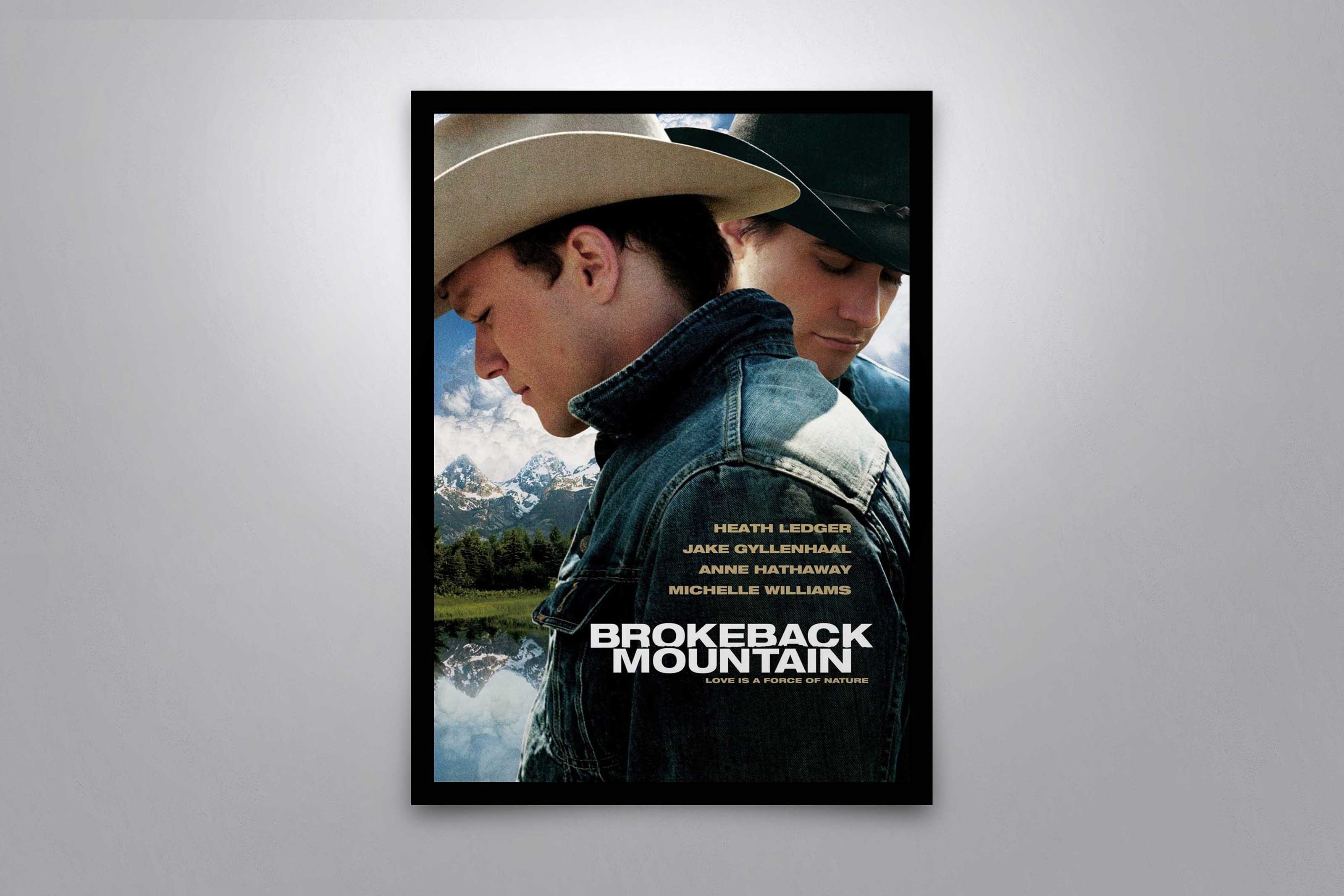Table of Contents
ToggleIntroduction
Brokeback Mountain Summary &Themes By Annie Proulx Annie Proulx’s short story Brokeback Mountain, first published in The New Yorker in 1997, is a poignant and groundbreaking narrative that explores themes of love, identity, societal expectations, and the complexities of human relationships. The story tells the tragic tale of two men, Ennis del Mar and Jack Twist, who fall in love while working together as cowboys on Brokeback Mountain in the 1960s. Over the course of their lives, they struggle with their emotions, their desires, and the oppressive societal forces that dictate the boundaries of their love.
The story is set in the American West, against the backdrop of rugged landscapes and the traditional values of rural, working-class America. Proulx masterfully uses the stark setting of the mountain to symbolize the isolation, emotional distance, and unfulfilled longing that Ennis and Jack experience.
The story explores the challenges they face in reconciling their love with the societal norms of masculinity, heterosexuality, and the expectations placed on them as men within their culture. Brokeback Mountain has since become iconic not only for its compelling characters and themes but also for its contribution to LGBTQ+ literature and its adaptation into an Oscar-winning film in 2005.
Summary of Brokeback Mountain by Annie Proulx
Brokeback Mountain begins in 1963 when two young men, Ennis del Mar and Jack Twist, are hired to work as sheep herders for the summer on Brokeback Mountain, a remote part of Wyoming. Ennis, a taciturn and reserved man, is introduced as the more emotionally closed-off of the two. Jack, in contrast, is more open and affable. They come from different backgrounds—Ennis is poor, raised on a ranch, while Jack comes from a slightly more privileged background, though still working-class. The two men form a bond during their time together on the mountain, and their friendship soon turns into a romantic and sexual relationship.
In the isolated wilderness of Brokeback Mountain, the two men experience a love that is free from societal judgment, and their bond deepens. However, as the summer ends, they are forced to part ways and return to their separate lives. Ennis marries his girlfriend, Alma, and Jack eventually marries a woman named Lureen. Both men lead lives that appear outwardly normal but are internally tortured by their ongoing feelings for one another. They are unable to publicly acknowledge their love, especially given the social and cultural climate of the time, which would not tolerate same-sex relationships.
Read more
Over the years, Ennis and Jack continue to meet secretly, sneaking away from their families and responsibilities to rekindle their bond. These secretive meetings occur on Brokeback Mountain, which becomes a metaphorical and literal space where they can be themselves, free from societal judgment. Despite their deep emotional connection, the pressures of their families and society weigh heavily on both men. Ennis, in particular, is emotionally repressed and struggles with guilt, fear, and anger. He cannot fully embrace his love for Jack, leading to tension and frustration in their relationship.
As the years pass, both men experience personal hardships. Ennis’s marriage to Alma falls apart after she discovers the true nature of his relationship with Jack. Jack, too, faces difficulties in his marriage to Lureen, who is emotionally distant and uninterested in Jack’s desires. The pain of their unfulfilled love and the inability to live openly causes both men great emotional distress.Brokeback Mountain Summary &Themes By Annie Proulx
Tragically, the story culminates in Jack’s untimely death. Ennis receives the news that Jack was killed in a brutal accident, leaving him devastated and heartbroken. The death of Jack is a turning point in Ennis’s life, and he is left to reflect on the love they shared, the pain of their lost potential, and the oppressive forces that kept them apart.
The story ends with Ennis, now older and emotionally scarred, looking at a picture of Jack in his closet, a memento of their relationship. Ennis is still unable to fully embrace his love for Jack and continues to live a life of emotional isolation. However, the memory of their time together on Brokeback Mountain remains with him as the only true love he ever knew.Brokeback Mountain Summary &Themes By Annie Proulx

Themes in Brokeback Mountain by Annie Proulx
1. The Complexity of Love and Desire
At the heart of Brokeback Mountain is the theme of love, which is portrayed as complex, messy, and often painful. The love between Ennis and Jack is not straightforward—it is born out of a deep, unspoken connection that grows over time. Despite the intensity of their feelings for each other, their love is not accepted by society, and they are forced to keep it hidden.Brokeback Mountain Summary &Themes By Annie Proulx
Proulx depicts the challenges of maintaining a love that cannot be openly expressed, and how this repression leads to emotional turmoil. The love between Ennis and Jack is tragic not because it lacks depth, but because it is constrained by the norms and expectations of their time and place.
2. Masculinity and Societal Expectations
The story explores how traditional notions of masculinity shape the lives of men, especially in rural, working-class America. Both Ennis and Jack are deeply influenced by societal expectations of what it means to be a man. They are raised to be tough, stoic, and emotionally distant, and their love for each other directly challenges these norms. Ennis, in particular, struggles with his identity as a man, fearing the judgment and rejection of others if his sexual orientation were revealed.
The pressure to conform to these ideals of masculinity prevents him from fully embracing his love for Jack, leading to a life of internal conflict. Proulx uses the theme of masculinity to show the damage caused by rigid gender expectations, particularly in the context of same-sex desire.Brokeback Mountain Summary &Themes By Annie Proulx
Read more
3. Homophobia and Social Isolation
Brokeback Mountain Summary &Themes By Annie Proulx Brokeback Mountain highlights the powerful impact of homophobia and the societal stigma against same-sex relationships. Ennis and Jack’s love for each other is portrayed as both beautiful and tragic because it exists in a world that condemns it. The characters are constantly aware of the dangers of being found out, and this fear of exposure drives many of their decisions.
Homophobia is not just an external threat, but an internalized force that creates self-loathing, guilt, and shame in the characters. The men’s isolation from the world around them is palpable, and their secretive meetings on Brokeback Mountain serve as an escape from the harsh reality of societal judgment. The story underscores the emotional and psychological toll of living in a world that rejects non-heteronormative love.Brokeback Mountain Summary &Themes By Annie Proulx
4. The Passage of Time and Regret
Time plays a significant role in the narrative of Brokeback Mountain. The years that pass between Ennis and Jack’s meetings are marked by regret, longing, and missed opportunities. Both men realize that they will never live the lives they might have wanted—lives in which they could love each other openly and without fear. Ennis, in particular, reflects on how he failed to fully embrace the love he shared with Jack, and this regret lingers throughout his life. The passage of time is shown to both heal and deepen the pain of their lost love, leaving both characters with the haunting awareness that they never had the chance to live the life they desired.
5. The Natural World as a Symbol
The setting of Brokeback Mountain is integral to the story’s themes. The mountain itself serves as a symbol of both freedom and confinement. On the mountain, Ennis and Jack are able to escape the constraints of society and experience a love that feels pure and untainted. The wild, rugged landscape reflects the rawness and intensity of their emotions.Brokeback Mountain Summary &Themes By Annie Proulx
However, the mountain is also a symbol of the limitations they face—despite its beauty and remoteness, it is still a space where they cannot be free to express their love without fear of consequences. The mountain’s dual nature—both a sanctuary and a prison—reflects the tension between their desire for freedom and the constraints of the world they live in.

Conclusion
Brokeback Mountain Summary &Themes By Annie Proulx In Brokeback Mountain, Annie Proulx delivers a heart-wrenching narrative that examines the complexities of love, identity, and societal pressures. Through the relationship between Ennis and Jack, the story explores the pain and isolation that result from loving in a world that cannot accept certain forms of love.
The themes of masculinity, societal expectations, and homophobia are poignantly illustrated, making Brokeback Mountain a landmark work in both American literature and LGBTQ+ representation. Through its depiction of longing, regret, and the human need for connection, Proulx’s story continues to resonate with readers around the world.Brokeback Mountain Summary &Themes By Annie Proulx
Read more
FAQ
Q1: Why is the title Brokeback Mountain significant?
The title of the story refers to the mountain where Ennis and Jack first meet and begin their romantic relationship. Brokeback Mountain is a place of refuge for the men, where they can experience their love away from the judgment of society. However, the title also hints at the fractured, painful nature of their relationship and the emotional weight they carry throughout their lives. The mountain symbolizes both the beauty and tragedy of their love.
Q2: What does Ennis’s reluctance to embrace his love for Jack signify?
Ennis’s reluctance to fully embrace his love for Jack is a result of his internalized fear of societal rejection and the rigid expectations of masculinity. Ennis is deeply afraid of being perceived as weak or “unmanly,” and this fear leads him to repress his emotions and desires. His struggle highlights the harmful effects of societal norms on individual identity and relationships, particularly for LGBTQ individuals in a homophobic culture.
Q3: How does Brokeback Mountain address themes of masculinity?
The story critiques traditional notions of masculinity by illustrating how these ideals limit the emotional lives of men. Both Ennis and Jack are shaped by the belief that real men must be stoic, strong, and emotionally detached, and this belief leads to their suffering. Proulx shows that true emotional intimacy and connection require vulnerability and openness, qualities that are often suppressed by traditional masculine ideals.
Q4: Why is the ending of Brokeback Mountain so tragic?
The ending of Brokeback Mountain is tragic because it shows the devastating consequences of a love that cannot be publicly acknowledged. Despite the depth of their connection, the societal forces surrounding Ennis and Jack—homophobia, social isolation, and the expectations of masculinity—prevent them from fully embracing each other. The story ends with Ennis grieving Jack’s death, unable to escape the regret and sorrow of a life filled with missed opportunities for happiness.
Q5: How does Brokeback Mountain contribute to LGBTQ+ literature?
Brokeback Mountain is significant in LGBTQ+ literature because it brings to light the struggles of same-sex love in a society that marginalizes and oppresses it. The story is a nuanced exploration of desire, identity, and societal expectations, making it an important work in both mainstream and LGBTQ+ literary traditions. Its depiction of the emotional toll of repressed love resonated with many readers and highlighted the need for greater acceptance and understanding of diverse sexualities.
Read more
















